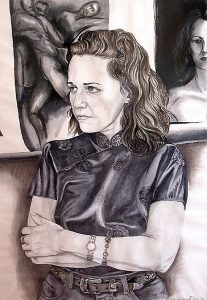Kathryn Gabinet-Kroo

American-born translator Kathryn Gabinet-Kroo came to Quebec speaking only high-school French but after successfully pursuing a career as a professional artist and teaching drawing and painting for ten years, she returned to school and earned a Certificate in Translation from McGill University and a Master’s in Translation Studies from Concordia University. Working out of her Montreal artist’s studio, she has translated six novels by Quebec authors as well as a collection of short stories by Canadian Indigenous writers. Excerpts of her translations have appeared in Geist and the Exile Quarterly, as well as online at carte-blanche.org, quebecreads.com, ambos.ca and jewishfiction.net.
1. What are you reading at the moment and would you recommend it?
I’m a member of two book clubs so I read a lot, even if not according to personal choice. I just read James McBride’s Deacon King Kong (fabulous on many levels) and Isabel Allende’s A Long Petal of the Sea (a real disappointment after The Japanese Lover).
2. Do you read translations? More specifically, do you read translations in the language from which you translate?
I do, if I don’t speak the language, so I read quite a few Israeli authors in translation: Amos Oz, David Grossman, Meir Shalev and Dorit Rabinyan. I translate from French, so I always read those works in the original (unless I’m reviewing a translation). That’s the fun of knowing a second language!
3. Are you working on anything at the moment?
Late this winter, I finished the final edit of my translation of Marc Séguin’s Les repentirs for publication this summer (A Fine Line, Exile Editions) and just settled the cover design for my translation of Michael Delisle’s Feu de mon père (Flame Out, Guernica). Working with Exile on grant applications for two more Quebec novels, so I’m hoping for new projects in the fall.
4. What was your first translation? How did this experience impact your career?
I’m also a professional artist and used to translate artist statements when I taught at the Saidye Bronfman Centre School of Fine Arts… my first paid translations. It spurred me to go back to school to join the first cohort in Concordia’s Master’s of Translation Studies program.
5. If you could travel back in time to the start of your career, what advice would you give yourself?
Be brave(r). Take the initiative.
6. What is your dream project? In other words, if you could choose any book to be translated, regardless of publishing rights, or if the text had already been translated, what would it be?
I did my Master’s thesis on Catherine Mavrikakis’s first novel back in 2000 and have been trying to get a publisher to commit to publishing a translation of one of her subsequent novels, to no avail. I’d love to translate either L’Annexe or La ballade d’Ali Baba.
7. What is your chief characteristic as a translator?
I think I’m good at “hearing voice(s)”… I think I have an ear for the ways different people speak.
8. What is the quality you most like in a translator?
As a reader: the ability to make me forget you were ever there! Get your name in lights when the credits roll, but I don’t want to know you intervened between the original author and me.
9. What is your main flaw as a translator?
I sometimes get attached to a certain phrase or sentence and have a hard time letting go and revising.
10. What is it that you most dislike in translations?
I hate it when translators get idioms and slang wrong. My nightmare example comes from a well-known translator, who shall remain nameless. May he rest in peace but he translated “Amène ton criss de corps icitte” as “Bring your Christly body here.” Not in Quebec, you don’t!
11. What is your current state of mind?
Covid-weird, Covid-weary. Haven’t seen a single family member in 3D for 15 months. Severe withdrawal symptoms.
12. For what fault have you most tolerance?
Fashion faux pas.
13. What is your favourite motto?
“It is what it is… until you change it.”
